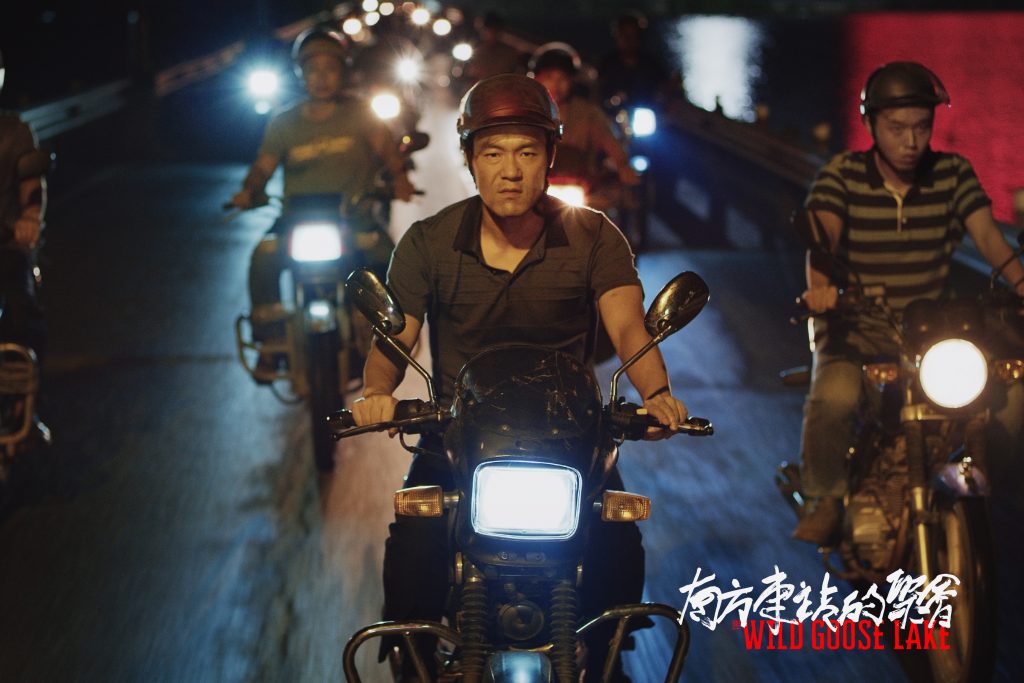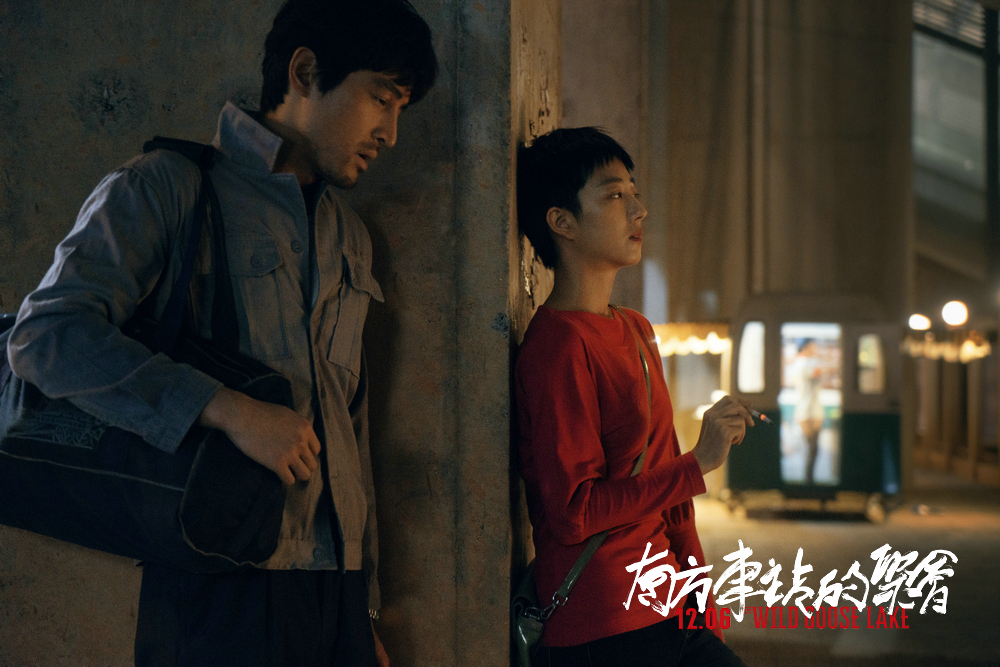The Wild Goose Lake opens in New York on Friday, March 6, 2020 at Film Forum.
China may have once been a nation of bicycles, but its art-house cinema has long been enamored by the bike’s gruff elder brother, the motorcycle. The indie classic, Suzhou River, set a tone at the turn of the century offering romance on the dust-choked roads of a Shanghai under construction. More recently, Kaili Blues darkened the elegy with a 45-minute night ride through misty country villages. Now, The Wild Goose Lake focuses on the machine itself, its mercantile value, and its remarkable capacity to accompany violence.
Liao Fan, the lead from Director Diao Yinan’s breakout picture, returns as a nameless detective pursuing Zhou Zenong (Hu Ge), a criminal wanted for the murder of a police officer. But here, local bike stealing gangsters, blessed with nicknames such as “cat eyes” and “redhead,” are also on the case and receive equal screen time. The result is a breathless police procedural that illuminates — in hues of sickly neon — the corruption of life beyond China’s gleaming megacities.
Chinese law enforcement is often portrayed as an omniscient entity, one backed by a nexus of big data technologies, but Dai’s police force is a thoroughly low-tech affair. Early on, burner phones are tossed from bridges and trampled underfoot which sets off an old-school manhunt as officers scour rain-stained apartment blocks and underground mahjong parlors in search of Zhou.
Despite having served an informal apprenticeship under leading Chinese filmmaker Jia Zhangke — Diao started as a screenwriter for Jia and later welcomed him as an advisor on Uniform, his debut feature — Diao’s social commentary is less pointed, more mired in the mud than those of his mentor. In Diao’s world, factories sag under the weight of protection fees, prostitution is commonplace, and the eponymous lake is an area “no one really controls” to quote the crime unit’s captain, yet there is no obvious answer. By contrast, the inequity and corruption of life in small-town China found in Jia’s A Touch of Sin and Mountains May Depart often takes aim directly at officialdom, sometimes literally.
Instead, Diao works to blur the identity of gangster and police officer in the increasingly claustrophobic world they are fighting over. From the beginning, uniforms are ditched for the sake of running a plainclothes operation and any attempt to tell policeman from gangster becomes difficult. Both groups are comprised of young men with close-cropped hair and provincial — read tacky (土酷) — attire, though as one officer learns in reprimand from a superior “biker gangs don’t wear Versace.”
This humorous mirroring continues with their respective meetings. We may shift from the damp of a hotel basement to the light of police headquarters, but both sides are scrambling in the dark throughout, despite working from identical wall maps. The only differences are that gangsters don’t require firearm training and police officers sit on chairs.
The film opens midway through Zhou’s escape with a secret rendezvous outside the local train station. Prowling among the concrete shadows, Zhou agonizes over trusting Liu Aiai (Gwei Lun-mei), a gang-connected “bathing beauty,” the local name for women who linger lakeside in summer. In a series of flashbacks, Zhou outlines the train of events that set him on the run. Liu is far from the classic femme fatale we might expect in film noir, androgynous and aloof, she remains expressionless as she hears of how “the Olympic games of bike theft” meant to settle a territorial dispute between rival gangs led to the death of a police officer.
Liu claims to have been sent in place of his estranged wife, Yang Shujun (Wan Qian), and Zhou, wounded, hungry and alone, is in no position to refuse help. Liu moves Zhou around various hiding places and as the desperate scramble continues and the cordon around him tightens, it becomes clear that only Diao’s female characters retain a semblance of control.
The Wild Goose Lake shares the ghostly nocturnal meanderings of Bi Gan’s highly-acclaimed Long Day’s Journey into Night, but also it owes much to mid-century Japanese crime films. In particular, the rich shadow play of black and white Kurosawa (think Drunken Angel and Stray Dog). This reference seeps into Diao’s score at moments of heightened tension through chords of the samisen, a three-stringed instrument frequently used during Japanese fight scenes. Here, they’re interwoven with guns strummed along railings and, of course, the purring of motorbikes.
Diao’s film is hardly a reconception of the neo-noir genre, but then again, it’s not trying to be. Rather, The Wild Goose Lake plunges audiences among feckless characters trapped in lurid small-town China. Sometimes we don’t watch for plot alone. Though Zhou’s fate is as predictable as the rain which never ceases to fall, the filmmaker’s mastery of narrative pacing and lighting ensure it remains an exhilarating ride.







